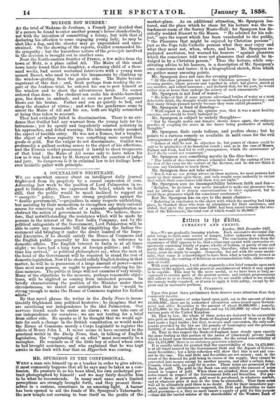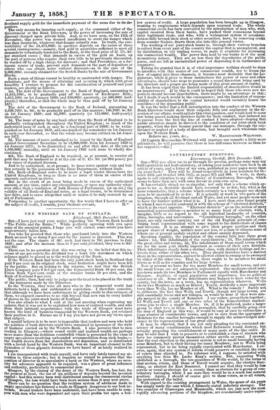Itittro to t#t Ettitnr.
CURRENCY AND CREDIT.
London, 2816 December 1857.
Sul—We are gradually learning wisdom. Each successive decennial dis- aster brings to light some source of danger, before unknown or unheeded, in our monetary and commercial systems. The conclusion drawn from the experience of 1857 appears to be, that a crisis may coexist with currencies re- spectively consisting wholly of paper, wholly of bullion, or partly of one and partly the other ; and that in some cause, therefore, other than mere cur- rency, must its origin be sought. Generally, but not with the same unani- mity, that cause is acknowledged to have been what is variously termed as over-banking, discounting of fictitious or accommodation-bills, undue exten- sion of credit.
With your permission, I will offer separately a few brief remarks upon each division of the subject, and the practical amendments of which it may appear to be capable. This may be the more useful, as we have been so long ac- customed to certain parts of the present system, and certain prepossessions still adhere to us so Closely, that even yet we are unable either to see clearly the remedy really required, or if seen to apply it with safety, except by de- grees and in successive portions.
I. CURRENCY.
Upon this point three preliminary facts deserve more attention than they commonly receive.
1st, That, exclusive of notes based upon gold, say to the amount of about 10,000,000/., there are in authorized circulation notes issued upon Govern- ment and other Securities to the amount of about 30,000,000!.; namely, 14,475,0001. by the Bank of England, and say 15,526,000/. by other banks in various parts of the United Kingdom.
2d, That by law, the whole of these notes are declared to be convertible into gold on demand; and the Bank-of-England portion of them is in Eng- land made a legal tender ; but that, to secure such conversion, the only safe- guards provided by the law are the penalty of bankruptcy and the personal liability of such shareholders as have not a charter.
3d, That in this respect the Bank-of-England issue stands upon exactly the same footing as that portion of the issues of (chartered) private banks which is based upon Government Securities : for the actual convertibility of this 14,475,000/. there is no statutory provision whatever. It is usually taken for granted that the convertibility of this 14,476,000/. is at all times insured by the Government Debt and the deposit of Govern- ment Securities ; but a little reflection will show that this is not and can- not be the case. The said Debt and Securities are not money ; and, in the event of the demand for gold being in excess of the supply, they cannot be converted into money except by another process, and after a certain delay. Consols, when sold, are paid for in notes. Those notes are presented at the Bank, for gold. The gold in the Bank can only satisfy the amount of notes issued in respect of gold. When these are satisfied, there yet remain the notes issued in respect of the Government Debt and Seourities. For pay- ment of these, if presented, gold must be purchased, in whatever market, and at whatever price it may at the time be obtainable. That these notes will all be ultimately paid there is no doubt. But for their immediate pay- ment, under the circumstances supposed, the Debt and Securities no more afford provision—i. e. they no more insure a supply of gold for this purpose —than did the landed estates of the shareholders of the Western Bank of
Scotland supply gold for the immediate payment of the sums due to its de- positors.
The only means for insuring such supply, at the command either of the Government or the Bank Directors, is the power of increasing the rate of discount charged upon private bills. And as we have seen, on the 12th of November, this power was deemed insufficient to avert the danger which was then imminent, whatever that danger aotually was. In truth, the con- vertibility of the 14,475,000/. in question depends on the union of three several contingencies—namely, that gold in quantities sufficient to meet all demands be voluntarily tendered to the Bank, at the fixed price of 3/. 17s. 9d. , per standard ounce; that demands in excess of the gold on hand, on the part of persons who require their own bills to be previously discounted, be warded off by a high charge for discount ; and that Providence, or a for- tunate course of trade prevent such demands on the part of depositors or others who can obtain notes without discount—as in the case of the 2000,0001. recently obtained for the Scotch Banks by the sale of Government stocks.
Such a state of things cannot be healthy or unattended with danger. The substitute and the means of attaining and securing it, which with great humility I venture to propose for the consideration of yourself and your readers, are shortly as follows. 1st, The debt of the Government to the Bank of England, amounting to 11,015,100/., to be gradually paid off by means of Exchequer Bills ; 1,015,100/. on 1st January 1859, and 250,000/. quarterly, (or 500,000/. half- yearly,) thereafter, so that the whole may be thus paid off by 1st January 1871.
The debt of the Government to the Bank of Ireland, amounting to 2,630,769/. 4s. f3d., to be gradually paid off in like manner 130,7691. 48. 8d. on 1st January 1869; and 62,500/. quarterly (or 125,000/. half-yearly) thereafter.
2d, The issue of notes by any bank other than the Bank of England to be gradually- extinguished throughout the United Kingdom ; so much of the authorized issue of each as may be a fractional part of 1000/. to be extin- guished on 1st January 18.59, and one-tenth of the remainder on 1st January in each year thereafter, so that the whole may become extinct on 1st Janu- ary 1871.
, The amount of notes authorized to be issued by the Bank of England against Government Securities to be 15,000,000/. from 1st January 1859 to 1st January 1872; to be diminished on and after that date at the rate of 1,000,000/. annually, until on 1st January 1886 such issue be wholly dis- continued.
4th, The Bank of England to be required, as at present, to receive all gold that may be tendered to it at the rate of 31. 178. 9d. (or 993 pence) per troy ounce of standard fineness.
And to be authorized, as at present, to issue notes against coin and bul- lion actually in the possession of the Issue Department, without limit. 6th, Bank-of-England notes to be made a legal tender throughout the United Kingdoms, so long as there is no issue of them in excess of the amounts authorized as above.
But in the event of an issue being made in excess of the authorized amount, at any time, under any circumstances, or upon any authority what- ever other than a resolution of both Houses of Parliament, (or an act,) the validity of all Bank-of-England notes, as a legal tender, to be determined ipso facto, and to cease altogether until or unless it be duly restored by an act of Parliament.
Postponing to another opportunity the few words that I have to offer on the subject of credit, I remain, your obedient servant, H.*



































 Previous page
Previous page